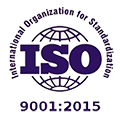ISO 9001:2015 Certification is accepted world wide as an assurance to customers, sub contractors and prospective partners that the company is reliable and able to consistently meet its contractual obligations.

Newly established version ISO 9001: 2015 Corporate Training developed and recommended by the ISO (International Organization for Standardization) headquartered in Geneva, Switzerland.
The ISO 9000 series of standards are applicable to all organizations that want to ensure a consistent ability to satisfy customer requirements.
ISO 9001:2015 Certification is accepted world wide as an assurance to customers, sub contractors and prospective partners that the company is reliable and able to consistently meet its contractual obligations.
It is more process based, the execution will be more compatible with how our clients do business, and will break down the artificial barriers between the elements of the standard that have existed.
By focusing more on process flows, customer satisfaction and continual improvement of the QMS, as it is believed that these changes will allow us to provide more added value for the clients.
ISO 9001: 2015 is based upon eight Corporate Training principles providing a framework to guide organizations towards continual improvement.
The 2015 revision emphasizes risk-based thinking throughout the entire Corporate Training process. This means:
Identifying & Analyzing Risks
You need to actively identify potential risks that could impact quality, both internal and external.
Evaluating Risk Severity
Assess the likelihood and potential impact of each risk on your objectives.
Developing Mitigation Strategies
Implement controls and actions to minimize the impact of identified risks.
Continuous Improvement
Regularly review and update your risk assessments and mitigation strategies based on new information or changes in the organization.
samrat associates - the management consultants & corporate trainers as a professionally managed pvt. Ltd. Company in india with the full name of samrat corporate consultants pvt. Ltd.
we are in the business of management consultancy & corporate training services for various type of systems certifications coveted as: iso 9001: 2015, iso 14001: 2015, iso 45001: 2018 (old ohsas 18001), brc - foods, brc - iop, fssc/iso 22000, iso 22000: 2018, haccp, sqf, ifs, kosher, halal, aib, fami-qs, organic, iso 27001: 2013, iso 20000, sa 8000, iso 30000, iatf/ts 16949, iso 10002, iso 17025: 2017, iso 13485, api q1, api / iso 29001, nabl, nabh, etc. And various product certifications like ce mark, ul mark, rohs, atex, iecex, etc.
also, we have a gigantic knowledge & experience of imparting various corporate training on such subjects like, usfda pcqi by fspca, lean manufacturing / management, 5s, kaizen, jit, ppap, apqp, haccp, gmp (good manufacturing practices), ghp (good hygienic practices), glp (good laboratory practices), behavioral aspects, effective personal productivity, group decision making, team work, leadership, business communication (verbal & nonverbal), occupational health & safety, presentation skills, negotiations skills, etc.
© 2025 coursetakers.com All Rights Reserved. Terms and Conditions of use | Privacy Policy